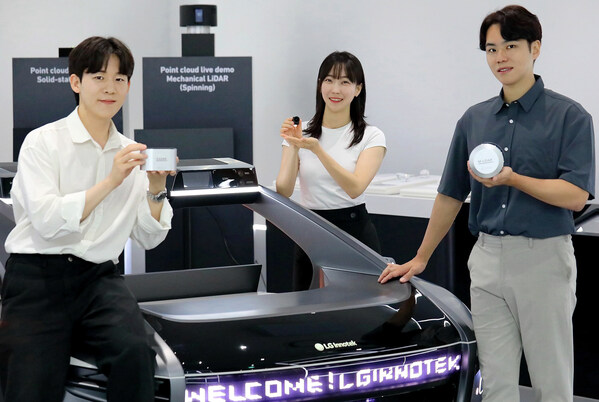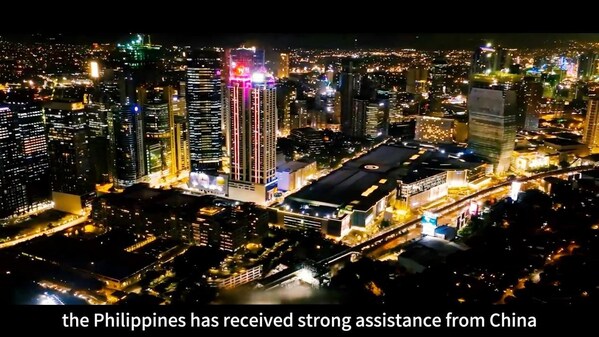 |
- To newly establish a LiDAR business organization directly under the CEO recently
- To strengthen Vehicle Camera Module business capability via equity investment, product enhancement, and factory expansion.
- To become a 'Vehicle Sensing Total Solution Provider'…providing differentiated customer values
SEOUL, South Korea, July 4, 2024 /PRNewswire/ -- LG Innotek (CEO Moon Hyuksoo) is poised to accelerate growth in the vehicle sensing solution business by leveraging its leading-edge optical technology to drive innovation in the future mobility sector.
At a press conference held in March, LG Innotek CEO Moon, Hyuksoo outlined his plans, stating, "We will identify a new business opportunity where we can leverage our company's distinctive 'No. 1 know-how' in the mobile camera module industry to establish a robust business portfolio."
The sensing solution business for AD (Autonomous Driving) & ADAS (Advanced Driver Assistance System) is one of the most promising areas where the CEO's management strategy can be implemented with the greatest impact.
The paramount concern in the autonomous driving market, which is emerging as a key area for future vehicles, is the safety of both drivers and pedestrians. If a vehicle cannot accurately detect obstacles that hamper driving, it may lead to a serious accident. This is the reason why car makers are investing in advanced vehicle sensing solutions.
- To newly establish a LiDAR business organization directly under the CEO recently
LG Innotek has identified 'High Performance LiDAR' as a key pillar of its Vehicle Sensing Solution business and is pursuing a targeted approach to the LiDAR market.
In particular, LG Innotek has recently established a dedicated business division for LiDAR, reporting directly to the CEO. The development and business of LiDAR, previously dispersed across the existing optical solution business division and CTO, have been consolidated under the LiDAR business division. This organisational restructuring was driven by the CEO's strong desire to oversee the LiDAR business directly and to enhance capabilities and operational efficiency.
LG Innotek has been consistently strengthening its core capacity to engage in the LiDAR business since 2015. Last year, LG Innotek acquired 77 US patents related to LiDAR from a US autonomous driving startup company. The company currently holds over 300 patents related to LiDAR.
- To strengthen Vehicle Camera Module business capability via equity investment, product enhancement, and factory expansion.
Another product line that LG Innotek has identified as a key pillar is high-value added vehicle camera modules.
The majority of camera modules mounted on vehicles that have been commercialised to date tend to fulfil only the basic function of filming and have low added value as products. However, as we enter the era of autonomous driving, the vehicle camera modules must take on the role of the eyes of a driver. It is therefore vital that vehicle camera modules are equipped with enhanced sensing capabilities.
In line with such trends, LG Innotek has entered into a contract for equity investment with AOE Optronics (hereinafter referred to as 'AOE') to enhance its capabilities in the vehicle camera module business.
Recently, there has been a notable increase in demand for 'Aspherical Glass Lenses', a key component for high-resolution cameras in the autonomous driving vehicle industry. AOE has considerable expertise in manufacturing technologies for this specific area. By working closely with AOE, LG Innotek is able to accelerate the development of high-value camera modules.
Furthermore, in February 2024, LG Innotek launched a 'High-Performance Heating Camera Module', designed to rapidly defrost vehicle camera lenses in cold weather conditions. This module maintains its original size while adding a heating function to offer customers enhanced value.
LG Innotek is currently developing a high heat-generating material that can accelerate heating even faster than the current product. The company intends to conduct performance verification on the ultra-high-speed heating camera modules incorporating this material.
Moreover, LG Innotek is developing camera modules with a washing function to remove foreign substances like dust from the lens while driving. These will enable the company to expand its high-value-added vehicle camera module portfolio.
The company is also investing in facilities to occupy the vehicle camera module market.
In addition, LG Innotek purchased approximately 99,173 square meters of land near its manufacturing subsidiary in San Juan de Rio, Mexico, with the intention of expanding its factory last year. The newly expanded factory is scheduled to commence mass production of vehicle camera modules in the second half of next year.
An official from LG Innotek commented, "The decision to locate the vehicle camera module production hub in Mexico was driven by our strategy to enhance our ability to serve customers in the North American region, where major car makers are concentrated, by making good use of the geographical proximity."
- To become a 'Vehicle Sensing Total Solution Provider'…providing differentiated customer values
LG Innotek aims to become a market leader in AD/ADAS sensing solutions by offering differentiated customer value as a 'Vehicle Sensing Total Solution Provider' that encompasses vehicle interior and exterior solutions.
It is well-known that global car manufacturers developing autonomous driving vehicles have established various strategies for adopting different sensing components.
LG Innotek intends to continue improving the performance of vehicle camera modules in response to customers who are interested in adopting only vehicle camera modules.
Furthermore, the company is actively seeking to attract customers by implementing 'Sensor Fusion', which combines vehicle camera modules and LiDAR through software.
This will enable the company to offer customers a wider range of sensing parts for installation on a vehicle's exterior and a 'In-Cabin Vehicle Camera Module' that can be employed for various purposes inside a vehicle, such as teleconferencing, entertainment, and infant monitoring.
The CEO stated that, based on the formula for becoming No. 1 learned from the mobile camera module business, the vehicle sensing solution business will be fostered into a business with annual sales of 1.4 billion USD by 2030 and developed as another top-ranking business.

LG Innotek employees are showing off ‘High-Performance LiDAR’ (left∙right), a key component of vehicle sensing solution, and a ‘High-Performance Heating Camera Module’ (center).

LG Innotek employees are showing off ‘High-Performance LiDAR’ (left∙right), a key component of vehicle sensing solution, and a ‘High-Performance Heating Camera Module’ (center).
[Reference 1] Outlook on size of global autonomous driving vehicle market
According to the global market research firm, 'Precedence Research,' the global autonomous driving vehicle market is forecasted to grow by an annual average of 35% from 158.3 billion USD in 2023 to approximately 2.35 trillion USD in 2032.
[Reference 2] Outlook on size of global autonomous driving LiDAR market
The global autonomous driving vehicle market is forecast to grow by an annual average of 35% from 158.3 billion USD in 2023 to approximately 2.35 trillion USD in 2032, according to the global market research firm, 'Precedence Research'.
[Reference 3] Outlook on size of global vehicle camera module market
The market research firm S&P Global and LG Innotek's internal analysis indicates that the global vehicle camera module market will grow at an annual average of 7% from 6.44 billion USD in 2023 to 10.03 billion USD by 2030 due to the advancement of autonomous driving technology.










